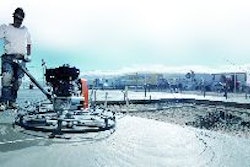As you all know, the economy is still in a funk as far as construction and real estate are concerned. Washington keeps telling us the recession is over, but when I talk to architects, contractors, equipment dealers and banks, they all tell me our industry is showing no signs of improving in the near future. As far as I'm concerned, they are using the wrong word to describe our industry - it is not a recession for us, but a depression.
Speaking to a banker recently, I let him know how his industry got us into this mess. We gave them our tax dollars to bail them out and, in exchange, they still refuse to loan any money for anything that has to do with real estate or construction. The lenders argue that the "credit folks" are running the banks and they have been told to avoid risky deals at all costs. While some banks are in the loan business, even they are avoiding our industry.
That being the case, contractors have to find ways to survive until the work environment improves. Most of you have cut expenses and are working with minimum personnel. You've sold off equipment and other assets to feed your bank balance, and are bidding on anything that will bring in a dollar. But even though you've taken these steps, there a few other situations you have to stay on top of to avoid surprises later this year.
Your tax situation
Believe it or not, you have to know where you stand tax-wise. Needless to say, you don't want to get behind on any taxes you have to pay because the penalties and interest will kill you.
In addition, those of you who own equipment and used the bonus depreciation rules will run out of depreciation deductions faster than your book depreciation reflects. You could wind up with a tax bill even though your books reflect a break-even or a loss. If so, you will not only have to pay the 2009 tax, but also estimated taxes for 2010 based on the 2009 tax. In short, make sure you know where you stand with your tax situation while there is still time to do something about it.
As a side note, if you have been selling off equipment, most of it probably has a low tax basis, which will lead to the situation noted above. This applies even to fairly new equipment if you used the bonus rules or the Section 179 write-off.
Your debt situation
Everybody is having a hard time financing their business, or meeting commitments already in place. Many banks have decided to get out of the construction business and have probably asked you to find another source of financing. If you find yourself on the short end of this stick, you have to worry about two things: negotiating a restructure program, and protecting yourself from personal guarantees. Both are tough to manage, but with some help and planning, they are doable.
Once banks decide they want out of a deal, they may be willing to negotiate terms if they think they can get more now as opposed to delaying the process when perhaps less may be available. For example, in one case, a company owed a bank $3 million dollars and was paying the interest only. Believe it or not, the bank came to the company and offered to close out the loan for a $1.5 million payment - a 50% discount! Not a bad deal, right?
You may not have the $1.5 million. But if you really want to stay away from personal guarantee issues, it may be in your best interest to find a buyer for the company who can pay off the balance and enable you to get out from under the bank debt. However, all is not a simple as it sounds. If the bank forgives the debt, you may wind up with debt forgiveness income and have to pay tax on $1.5 million. Oops.
This debt forgiveness issue is quite complex, yet there are ways to plan for it. One problem to consider is most companies these days are set up as flow-through companies, where the year-end results show up on the owner's tax return. If the company were set up as a C-corp, that might not be the case. Food for thought...
If you are in trouble with the bank, it is best to be proactive and tell them about your problems before a problem hits the fan. In addition, it will pay to get some help trying to restructure the loan, while trying to protect your personal assets because of any loan guarantees.
The tech issue
Many of you who own equipment have sold off units where utilization was projected to be slim. And since you didn't need the equipment, you may have also released some of your service technicians.
From what I hear, many of those technicians are not going to come back, and you will find yourself without people to keep the equipment rolling once business improves. To make matters worse, late-model equipment is much more complex to maintain. More extensive expertise is necessary to analyze the problem and know how to fix it. And with Interim Tier IV and hybrid units coming on line, this issue only becomes more serious.
Equipment dealers tell me they are getting more and more requests to maintain contractor fleets. This keeps contractors out of the repair business; keeps expensive payroll to a minimum; eliminates the need for expensive repair equipment and parts inventory; and probably improves uptime. Not a bad way to cut fixed costs to make them variable.
Of course, as we've mentioned before, equipment rental is also an option where the entire cost can be charged to a job, with the repair problems off your plate for good.
Final thoughts
Yes, things are bad, but there is no need to make them worse. Planning during good times and bad must go on, especially when it comes to tax and financing issues. Cutting overhead is also not a bad idea if you can transfer your maintenance work to another entity.



















